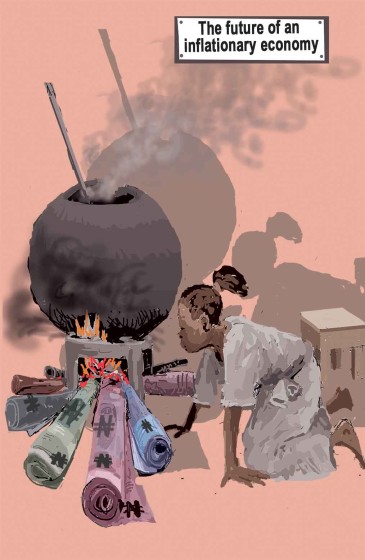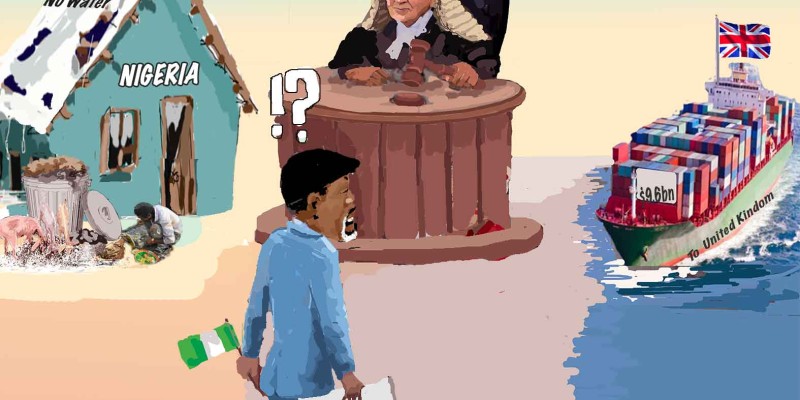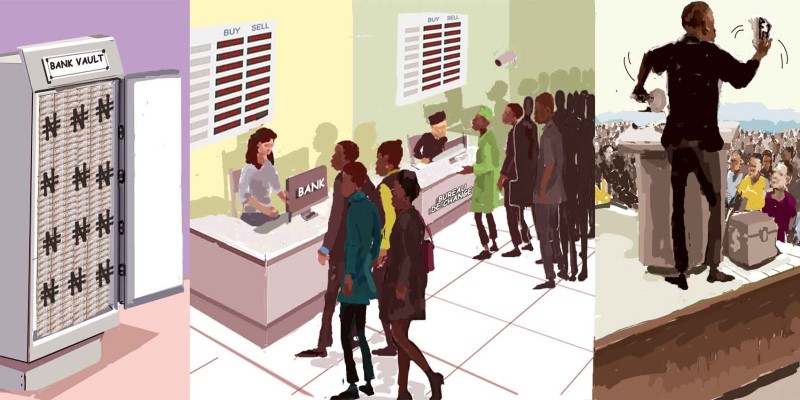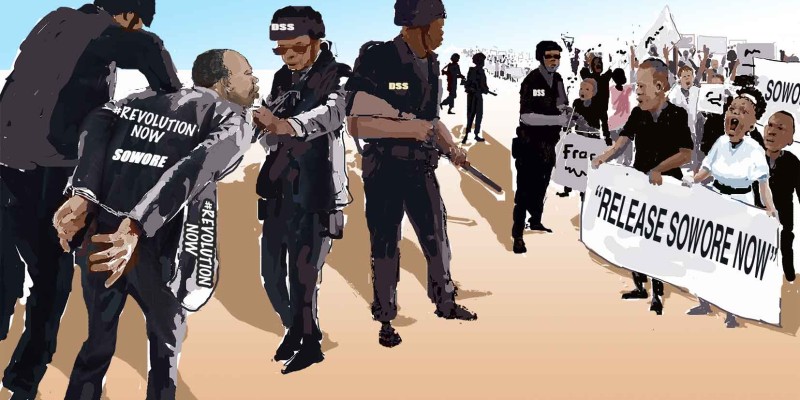$20BN IDLE DEPOSITS: BURDEN OR OPPORTUNITY?
By: Sir Henry Olujimi Boyo (Les Leba) first published in March 2016
INTRO:
Last week, this column republished “Is the Economy Poisoned by CBN $ Hoarding?” Which discusses the CBN’s ability to strengthen the Naira, and the failed strategies they continue to use. The article suggests a clear path towards a stronger currency.If you missed this republication, you can find it in the archives at the below link.
(See www.betternaijanow.com for this series and more articles by the Late Sir Henry Boyo)
Today’s republication is as the title suggests. The author shares a brief excerpt which forms the basis of the discussion regarding mismanagement of the Naira. It discusses the issue of idle foreign currency being hoarded in domiciliary accounts, and CBN’s redundant defense of mopping up excess liquidity to ‘prevent’ spiralling inflation. Kindly read on to learn how this poses a problem for local businesses and ultimately affects the everyday Nigerian.
As you read through the below article taking note of previous events and rates, keep in mind its initial publication (2016).
''As I'm talking to you, $20bn is in various domiciliary accounts of individuals. Naira is our currency, why are they keeping the foreign currency? From my experience in international finance, I have never seen a country where its nationals speculate on its currency." The preceding is an excerpt from the presentation of Dr. Joseph Nnanna, CBN Deputy Governor (Financial Systems Surveillance) at a recent meeting with the Joint Appropriation Committee of the National Assembly.
According to Nnanna, the huge idle dollar deposits in domiciliary accounts is allegedly "part of the reason why the naira has continued to slide against the dollar." Nevertheless, Nnanna warned that the CBN will not just "sit down and watch the consistent fall of the Naira"; consequently, he assured the committee that CBN "will embark on aggressive liquidity mop up to make the Naira stronger.''
Incidentally, CBN's instrument of choice for defending the Naira may seem 'strangely' consistent with the ceaseless advocacy for several years in this column minimize liquidity. Perhaps CBN's belated indication of the congruency of the separately prescribed solutions will dispel any misgiving about the true objective of this column. The question then, becomes why it took CBN, until reserves dwindled to compel this clearly common-sense approach to Naira exchange rate management. Still, it is better late than never; the reality nonetheless, is that aggressive liquidity mop, will inevitably also increase CBN's indebtedness, as hundreds of billions of naira perceived to be in excess supply will be kept sterile, in order to create an appropriate enabling environment, with characteristic features of low inflation and interest rates that would successfully promote economic growth.
Furthermore, in addition to the unusually high cost of funds borrowed, the CBN's defense of the Naira, in this fashion, will invariably also crowd out the real sector from access to the cheaper funds, which the economy urgently requires to create jobs. Evidently, the liquidity mop up projected back in Nov 2015 to soak up about N1.5Tn excess Naira supply between January-March 2016, is sadly, already failing to yield the desired positive results, as inflation and cost of funds are still inappropriately oppressive, while the Naira exchange rate remains under seige; ironically, however, despite this economic faux pas, Commercial banks will make more easy money from CBN's renewed vigor to 'aggressively' defend Naira!!
Indeed, Nnanna's palpable frustration may wrongly suggest that the persistent challenge of surplus Naira supply is instigated extraneously by some untamable alien powers. The reality, however, is that CBN, actually has sole responsibility for creating and managing money supply as near as possible to an optimal equilibrium that would induce inflation and interest rate levels, that can successfully drive inclusive growth. Unfortunately, the consistent failure of CBN's usual liquidity mop ups of Naira supply, continues to challenge consumer demand and restrain investment, with the attendant loss of potential job opportunities, while also creating impediment to successful economic diversification.
Curiously, the recent revelation of $20bn idle deposits in domiciliary accounts, may, sadly suggest that the odious culture of warehousing and sterilising trillions of Naira as idle deposits in CBN vaults and records, despite the prevailing acute shortage of investible funds, may have sadly manifested in the private sector, with billions of idle non interest yielding dollar deposits, which are not also applied to any socially productive purpose; sadly despite these idle Naira and Dollar deposits, both government and private businesses, still inexplicably decry the non-availability of reasonably priced funds to sustain inclusive growth.
It is certainly perplexing that we should presently be considering cap-in- hand external borrowing of $4.5bn to fund the 2016 budget, when in reality, our Money Deposit Banks can easily, strategically roundtrip the idle domiciliary funds as foreign investment to reap bountiful profits from the high yield in the business of lending to government. Furthermore, the existence of idle funds is actually anathema to the culture and success of banking practice.
Predictably, all depositors are never likely to descend on banks in one day to empty their accounts, unless there are signs of imminent distress in the sector. Thus, with the traditional predatory instinct of Nigerian banks, it is also unlikely that our undisputably 'smart', financial engineers would have ignored the bountiful opportunity to surreptitiously trade with their idle dollar’s deposits with absolutely no oversight control whatsoever from CBN. Ironically, however, the Nation's Banker may ultimately, be required to unfortunately bailout these same banks and restore international credibility to the sector, whenever banks recklessly mismanage funds or financially over reach themselves. Thus, in the light of the above distressful possibility, it would be inappropriate for CBN to stand by idly until 'Alarm blow' in banks before reacting to quench the fire by once again drawing down our precious national resources.
Consequently, it is imperative that CBN should formally recognise the obvious danger of leaving $20bn as idle deposits in commercial banks without regulatory oversight; the apex bank must therefore quickly seize the opportunity to galvanise this latent wealth towards successfully improving the economy. Advisedly, the deposits should still remain as balances in personal domiciliary accounts with respective banks, but CBN must become formal custodian of the dollars, just as it is with Naira, so as, to minimise the risk of financial recklessness and also avoid the likely possibility of default, by commercial banks operating without regulatory oversight.
Furthermore, in the same manner that CBN stipulates appropriate cash reserve ratios to influence the amount of Naira liquidity available for lending, similarly, the CBN could also formally adopt a conservative cash reserve ratio of about 50% to reduce the attendant risk and empower commercial banks to put the idle deposits positively to work in the economy with supportive rates of interest below 7%. Indeed, with such arrangement, and a monetary policy rate of say 2%, the owners of domiciliary accounts may also earn between 2-3% on their savings rather than the Zero returns they currently endure annually.
Nevertheless, every holder of a domiciliary account should be allowed free access to their dollar deposits, in the same manner that owners of Naira deposits currently operate their accounts. However, forex denominated loans must be dedicated to critical industrial subsectors that can drive multifaceted opportunities in manufacturing, agriculture and commerce; furthermore, the deposits may also be applied to providing, critical, visible, life changing infrastructural projects which have expansive positive social impact. Indeed, such government loans are considered to be relatively risk free, because our national assets serve as guarantee. Thus, the erstwhile idle burdensome dollar deposits, will probably be safer in CBN's custody than to remain as uncoordinated balances without appropriate regulatory oversight in Commercial banks.
Save Naira, Save Nigerians!!
$20BN IDLE DEPOSITS: BURDEN OR OPPORTUNITY? - 01082022







